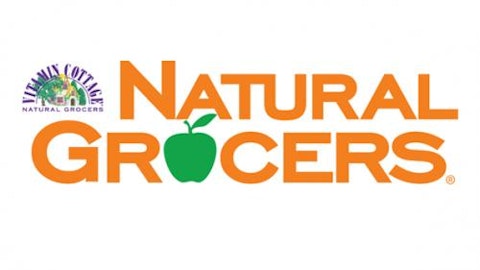The organic food craze has been great for investors over the years. Whole Foods Market, Inc. (NASDAQ:WFM) is one of the biggest benefactors. The stock has been a four bagger over the past five years, having returned an annualized 38% over this time.
Whole Foods Market, Inc. (NASDAQ:WFM) owns and operates the largest U.S. chain of natural- and organic- foods supermarkets. The news of late has been great, with the company posting June-ending quarter EPS of $0.38 compared to $0.31 in the same period last year.
Since being founded in 1980, Whole Foods Market, Inc. (NASDAQ:WFM) has grown to become the largest U.S. retailer of organic foods, with over 340 stores. Part of Whole Foods’ strategy of late has been acquisitions — around 30% of its store base is from acquisitions.

There’s no denying the rapid rise to fame of organic and natural foods, but the beauty of this industry is that the trend should continue higher — driven by a global rise of wealth (namely emerging market urbanization) and the spread of the awareness of healthy eating. And although year-over-year growth is slowing, the annual sales of organic foods are still very robust, with room to grow…

…in 2012, organic food sales only accounted for 3.5% of total U.S. food sales.
Top organic comp
The Fresh Market Inc (NASDAQ:TFM) is one of Whole Foods Market, Inc. (NASDAQ:WFM)’ chief competitors, having 130 small-format stores in 25 states. Revenue is expected to be up an impressive 14% in fiscal 2014, with 3.4% growth in same-store sales as the company continues growing square footage. The grocer plans to add upwards of 20 stores in 2014, and is expected to grow total square footage by 15%. The long-term target is to grow stores from 130 to 500.
The opportunity for growth is more than just pure store-number growth, but also geographical expansion. As of now, about 45% of its stores are located in Florida. I think the rising tide will lift this boat over the long term, in that The Fresh Market Inc (NASDAQ:TFM) will definitely benefit from a rise in organic- and natural-food demand.
More consolidation?
Ingles Markets, Incorporated (NASDAQ:IMKTA) operates a major supermarket chain across six Southeastern states, operating just over 200 stores. The stock tumbled some 10% last week on less-than-stellar quarterly results. Although sales were up 1.5% year-over-year for the 2Q, EPS came in at a $0.62 loss for the quarter from the $0.56 loss for the same period last year.
The small-time grocer got a big boost in its stock price earlier this year thanks to the Kroger-Harris Teeter buyout announcement. This gave investors hope that industry consolidation will continue. Ingles is up still up nearly 50% year-to-date, but is trading at over 50 times earnings compared to Harris Teeter’s 25 times.
However, Ingles does own a significant portion of its properties and it also operates a number of fuel stations. Around 35% of its grocery stores have fueling stations, and these fuel stations help increase traffic.
Bottom line
The high demand for organic foods isn’t going away anytime soon, and so the question becomes, what’s the best way to play the market? Whole Foods Market, Inc. (NASDAQ:WFM) has the broadest reach and appears to be investors’ best bet. The company is trading inline with The Fresh Market Inc (NASDAQ:TFM) at 38 times earnings, but analysts expects Whole Foods to grow EPS at an annualized 19% over the next five years. I like entire organic-foods retail industry for the long term.
Marshall Hargrave has no position in any stocks mentioned. The Motley Fool recommends The Fresh Market and Whole Foods Market. The Motley Fool owns shares of Whole Foods Market.
The article Organic Does Taste Better originally appeared on Fool.com.
Copyright © 1995 – 2013 The Motley Fool, LLC. All rights reserved. The Motley Fool has a disclosure policy.

